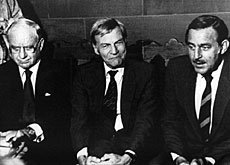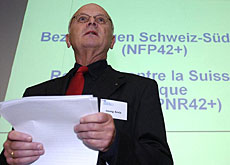Report sheds light on apartheid darkness

Switzerland propped up the apartheid regime in South Africa and the countries were closest during the worst human rights abuses, according to a study.
“Relations between Switzerland and South Africa”, carried out by Bern University historian Peter Hug for the Swiss National Science Foundation, is heavily critical of the Swiss government.
Hug says Switzerland’s decision not to apply sanctions imposed on South Africa by the United Nations benefited the regime in Pretoria.
Swiss connections to South Africa were closest during the 1980s, the height of the repression of the black resistance movement.
The report reveals that Switzerland maintained closer military, intelligence service, armaments industry and nuclear relations with South Africa during the apartheid era than was previously thought.
Damning revelations
Among the study’s revelations is the finding that Swiss industry got around the UN arms embargo in grand style.
Swiss industry even violated rules on arms exports defined by Switzerland, although they were interpreted far more narrowly than those of the UN.
The federal administration was informed of many illegal and semi-legal deals. It turned a blind eye to them – supporting some of them actively or criticising them only half-heartedly.
What’s more, the exchange of intelligence started five years earlier than was previously known and contributed to initiating arms deals, combating opponents of apartheid and airing political propaganda in favour of the South African government.
Swiss industry also belonged to the mainstays of the secret South African atomic weapons programme, the report finds.
The firms Gebrüder Sulzer AG and VAT Buchs delivered components vital to South African uranium enrichment that supplied the fissionable material needed for the six atomic bombs produced by South Africa.
Cold War ideology
Hug says that by keeping its distance from the UN after 1945, Switzerland’s tendency to harbour racist notions remained politically effective. This notion was replaced at the end of the 1970s by an equally ill-considered anticommunist stance.
“It was customary for most of those involved with Swiss business, society and all government departments to cooperate with South Africa’s apartheid state,” he says.
Given the climate of the Cold War, any criticism of this was stifled by the argument that the anticommunist defensive wall at the Cape must remain intact.
From 1980 on, the South African military attaché stationed previously in Rome, Cologne, or Vienna established himself in Bern. Many other countries were no longer prepared to accredit South African military attachés.
As emerges from documents prepared by South Africa’s military intelligence service, the South African military attaché considered it important to contact people like the Zurich “subversive hunter” Ernst Cincera, the director of the Swiss Ostinstitut, Peter Sager, and the president of the Working Group on Southern Africa, Christoph Blocher.
Blocher is currently the federal justice minister and a member of the rightwing Swiss People’s Party.
The activities of fellow Swiss People’s Party parliamentarian Ulrich Schlüer, who was on the board of the Working Group on Southern Africa and who has been in the House of Representatives since 1995, added to the orientation towards the extreme right of the political spectrum.
This is even admitted by Hansjürg Saager and Werner Vogt, two vociferous critics of the anti-apartheid movement and opponents of sanctions, in their recent book “Black Money on Table Mountain”.
Further lobby groups for South Africa included the Club of Friends for South Africa and the Swiss-South African Association, a sort of chamber of commerce whose members belonged to Swiss companies active in South Africa.
Swiss priorities
The UN and the anti-apartheid movement based their condemnation of South Africa on human rights and international law.
The Swiss authorities on the other hand justified their authorisation of closer economic ties with the apartheid regime by invoking state law, and in particular trade and industry freedom.
This is the verdict of Georg Kreis, president of the Swiss National Science Foundation, in the final report.
In a report for the Swiss National Science Foundation entitled “Between law and politics”, Bernese legal expert Jörg Künzli says Switzerland’s failure to impose sanctions on South Africa’s apartheid regime was not legally justified and that Switzerland let economic interests dictate its policy towards Pretoria.
Künzli says the Swiss rejection of sanctions was an economically motivated decision aimed less at protecting business relations than at promoting bilateral trade.
The government and parliament deliberately failed to close loopholes in the law – or delayed doing so – to allow trade relations to continue, he claims.
That it was possible for Switzerland to participate in sanctions became apparent in 1990 with sanctions against Iraq.
swissinfo, Jean-Michel Berthoud
“Relations between Switzerland and South Africa” is one of ten reports commissioned by the Swiss National Science Foundation to look at relations between Switzerland and South Africa.
In 2000 the Swiss government charged a team of 40 researchers with examining economic ties, contacts between churches, the international context, the public perception of the policy towards Pretoria and Switzerland’s attitude towards UN sanctions.
The research should have been completed by 2003, but the work was delayed by a government decision to limit access to archives.
A study carried out by Bern University historian Peter Hug for the Swiss National Science Foundation has focused on military, arms industry and nuclear relations between Switzerland and South Africa.
The study reveals that the Swiss arms industry violated Swiss law and a UN arms embargo against South Africa during the 1960s and 1970s.
It says Swiss companies were involved in the apartheid regime’s secret nuclear weapons programme to build nuclear bombs using enriched uranium.
It also alleges that the Swiss secret service had long-standing ties with South Africa and was involved in the arms trade.

In compliance with the JTI standards
More: SWI swissinfo.ch certified by the Journalism Trust Initiative














You can find an overview of ongoing debates with our journalists here . Please join us!
If you want to start a conversation about a topic raised in this article or want to report factual errors, email us at english@swissinfo.ch.